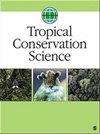学术激励不应促进“自然体验的灭绝”
IF 1.6
4区 环境科学与生态学
Q2 BIODIVERSITY CONSERVATION
引用次数: 3
摘要
有证据表明,人们接触自然的次数减少,与对自然的支持减少相对应——我们称之为自然体验的灭绝。在这里,我们评估了当前保护研究的三个趋势,并考虑它们是否有助于减少对自然的接触。我们认为,虽然使用传感器、算法、以技术为中心的思维、进行荟萃分析以及采取更多基于实验室的方法都有很大的潜力来推进保护目标,但它们会导致研究人员在该领域的时间减少,自然体验也会消失。研究人员实地考察时间的减少将意味着雇用和培训的当地实地助理减少;研究人员对地面现实的参与度较低;以及在保护研究、规划和实施方面的分歧。我们建议,保护科学领域应该平衡如何将时间和奖励分配给野外和非野外部分。如果我们不小心,我们将选择远离生物多样性本身和当地影响生物多样性的社区的研究人员。自疫情开始以来,许多研究人员无法前往他们的实地,如果不采取措施,新冠肺炎后世界的机构可能会推动自然体验灭绝的压力。本文章由计算机程序翻译,如有差异,请以英文原文为准。
Academic Incentives Should Not Promote the “Extinction of Nature Experience”
Evidence suggests that a decline in people’s exposure to nature corresponds to decreasing support for nature—a phenomenon we call extinction of nature experience. Here, we evaluate three current trends in conservation research and consider if they contribute to a decrease in exposure to nature. We suggest that while using sensors, algorithms, technocentric thinking, conducting meta-analyses, and taking more lab-based approaches all have significant potential to advance conservation goals, they lead to researchers spending less time in the field and an extinction of nature experience. A reduction of researcher field time will mean fewer local field assistants are hired and trained; lower engagement of researchers with ground realities; and a rift in conservation research, planning, and implementation. We suggest that the field of conservation science should balance how it allocates time and rewards to field versus non-field components. If we are not careful, we will select researchers that are distant from the biodiversity itself and the communities that are affecting it locally. Since the pandemic began many researchers were unable to go to their field sites and if care is not taken, the pressures that promote the extinction of nature experience may be promoted by institutions in a post–COVID-19 world.
求助全文
通过发布文献求助,成功后即可免费获取论文全文。
去求助
来源期刊

Tropical Conservation Science
BIODIVERSITY CONSERVATION-
CiteScore
3.60
自引率
5.90%
发文量
16
审稿时长
>12 weeks
期刊介绍:
Tropical Conservation Science is a peer-reviewed, open access journal that publishes original research papers and state-of-the-art reviews of broad interest to the field of conservation of tropical forests and of other tropical ecosystems.
 求助内容:
求助内容: 应助结果提醒方式:
应助结果提醒方式:


